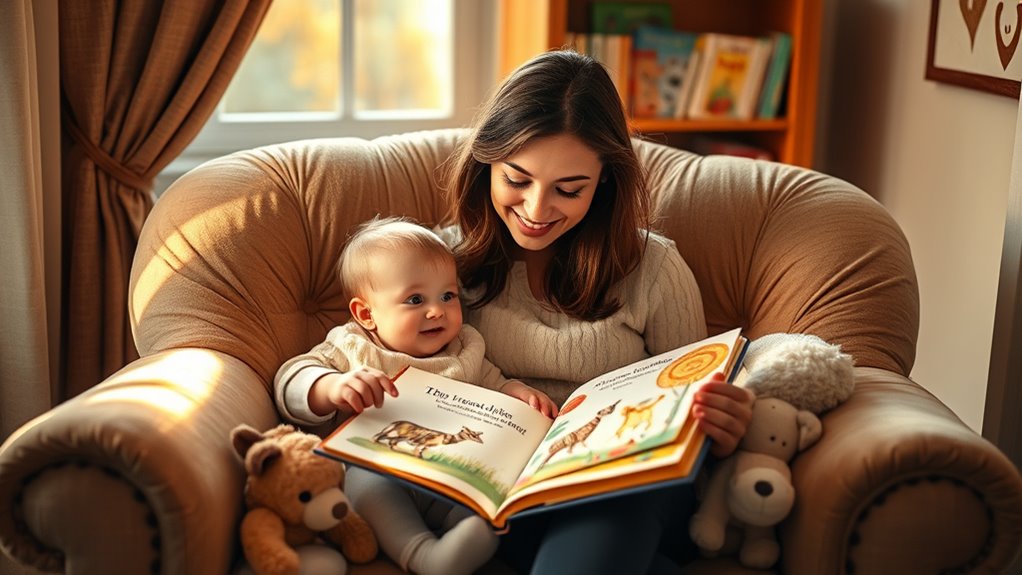Engaging in story time with your baby boosts their brain development and language skills. As you read aloud, you’re helping to expand their vocabulary and improve processing speed. This early exposure sets a strong foundation for literacy and school readiness. Plus, it sparks imagination and strengthens your emotional bond. By making this a daily routine, you nurture their love for learning. There’s so much more to discover about the lasting impact of these precious moments together.
Key Takeaways
- Reading aloud to babies enhances brain development by forming neural pathways and fostering cognitive growth in early childhood.
- Daily storytime improves language skills, expanding vocabulary and processing speed for better communication abilities.
- Engaging with books supports early literacy, preparing babies for school and enhancing critical thinking and memory.
- Storytime fosters imagination and emotional connections, promoting focus, social skills, and emotional intelligence between caregiver and baby.
- Early reading habits lead to long-term educational success, increasing the likelihood of reading at grade level and high school graduation rates.

Reading benefits for babies are immense, and incorporating this simple activity into your daily routine can lay the groundwork for their future success. When you read aloud to your little one, you’re not just sharing a story; you’re promoting their brain development. Engaging with books helps form neural pathways, enhancing their learning capabilities. In those crucial first three years, early exposure to reading significantly supports rapid cognitive growth, ensuring that your baby’s brain is primed for learning.
As you flip through pages, you stimulate their language skills, which contributes to overall brain development. Each word you read expands their vocabulary, making it easier for them to express themselves as they grow. You’ll notice improvements in their processing speed, too, as they engage with the language and stories you share. Daily reading can lead to better language scores even as early as nine months, setting them up for strong communication skills essential for future academic success.
Reading to your baby fosters early literacy skills, preparing them for school. It supports both receptive language—what they understand—and expressive language—the words they use. You’re not just helping them speak; you’re paving the way for better school readiness and academic performance. The cognitive benefits of reading extend to stimulating critical thinking skills, enhancing memory, and developing problem-solving abilities. Engaging with stories encourages recall and recognition, enhancing their memory.
Moreover, reading inspires imagination and curiosity—traits that are vital for lifelong learning. As you create a routine of storytime, you help your child develop focus and concentration, skills that will serve them well in school and beyond. You also ignite their print motivation, encouraging them to engage with reading materials on their own.
The emotional and social benefits are equally important. Reading together builds a strong bond between you and your baby, enhancing your emotional connection. It helps develop social skills when interacting with peers in group settings, and discussing stories fosters emotional intelligence by helping them understand and express feelings.
Lastly, establishing early reading habits contributes to their long-term educational success. Children who develop strong language skills early are more likely to read at grade level by third grade, and they’re linked to higher high school graduation rates. By making reading a regular part of your day, you’re not just nurturing a love for stories; you’re laying the foundation for a lifetime of learning.
Frequently Asked Questions
What Age Should I Start Reading to My Baby?
You can start reading to your baby right from birth—there’s no age limit!
Even prenatal reading can be beneficial. The sounds and rhythms of your voice stimulate their brain and foster early language skills.
Establishing a reading routine within the first year is crucial for building vocabulary and strong reading habits.
How Long Should Each Reading Session Last?
Each reading session should last around 3-5 minutes for babies 0-3 months, and you can repeat this a couple of times daily.
As your baby grows, extend the sessions to 5-10 minutes for 4-6 months, and up to 10-15 minutes for 7-12 months.
Pay attention to your baby’s engagement and mood; if they’re interested, you can slightly increase the duration to keep them captivated and eager for more.
What Types of Books Are Best for Infants?
You might think infants wouldn’t care about books, but they actually do!
For your little one, choose sturdy books with simple text and bright images. Infants love clear faces and vibrant colors, making those engaging.
Look for interactive features like lift-the-flaps or textures to keep their attention. Also, consider sensory elements to enhance their experience.
Can Audiobooks Be Beneficial for Babies Too?
Yes, audiobooks can be beneficial for babies! They expose your little one to diverse words and sounds, enhancing language development.
As your baby listens, they improve their focus and comprehension skills while exploring their imagination. Audiobooks also encourage emotional intelligence by introducing various feelings.
Plus, they’re perfect for busy families, allowing you to share stories on the go or during quiet moments, fostering bonding and curiosity in a fun, engaging way.
How Can I Make Reading More Interactive With My Baby?
You might think reading to your baby is a simple task, but it can be so much more interactive!
Start by choosing books with textures and flaps that invite exploration. Use your animated voice and big facial expressions to draw their attention.
Encourage them to turn pages and point to pictures as you name them. Incorporate fun sounds and props to make each session lively.
Together, you’ll create a delightful reading experience!
Conclusion
In the grand tapestry of your baby’s development, reading weaves vibrant threads of language and imagination. By sharing stories, you’re not just passing time; you’re nurturing curiosity and building a bond that lasts a lifetime. Every page turned is a step toward unlocking their potential. So, snuggle up with a book, let your voices dance through the words, and watch as your little one blossoms into a lifelong lover of stories. The magic of reading starts today!








